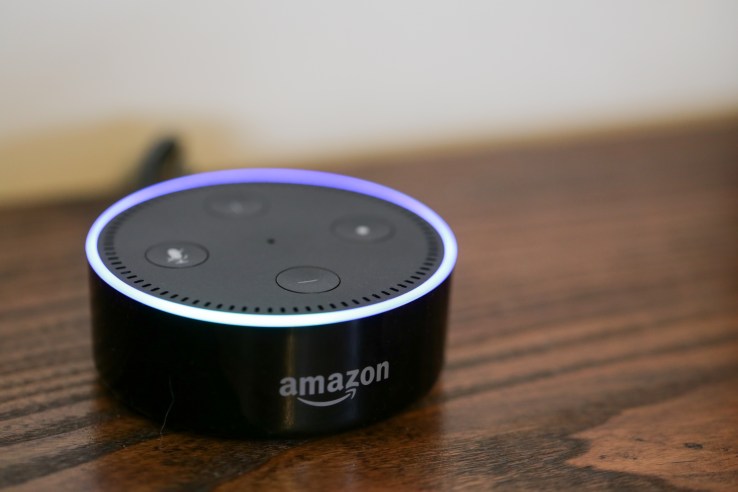

Amazon is making it easier for Echo and Alexa-powered device owners to find voice apps that extend the functionality of its virtual assistant. The company recently launched a new feature that has Alexa making suggestions of third-party skills to try in response to certain questions. In other words, if you ask Alexa to do something that she’s not capable of, she’ll point you to a skill that can perform that task instead.
Alexa’s ability to recommend third-party skills was first spotted by Voicebot.ai, which noted that, in the past, Alexa would only say that she couldn’t help you when you asked a question she didn’t know the answer to.
For instance, Alexa would often respond like, “Hmmm. I don’t know that,” or she might tell you to check back later.
If you wanted to find a skill that suited your needs, then, you’d have to browse through the Alexa Skill Store on the web or in the Alexa companion app.
However, now things are changing. Recently, the virtual assistant has gotten clued into what the voice apps written for her platform can do, and will make suggestions if she thinks there’s one that can help you with your question.
Amazon has confirmed this skill recommendation functionality is new, but it’s not yet broadly rolled out either in terms of supported skills or Alexa’s customer base.
“Currently, in limited scenarios, Alexa will respond to certain questions by suggesting skills that may be helpful,” an Amazon spokesperson told TechCrunch. “We are excited for this feature to expand and to roll out to more customers over time to help them discover new skills and get information through Alexa.”
Voicebot had noticed this new trick when asking Alexa a question related to a stock price. Before the new feature, getting a response to the question at hand would mean asking Alexa to open a third-party skill that delivers this kind of information. Now, however, when Alexa was asked a stock price question she didn’t know the answer to, she responded “I don’t know that. Maybe the skill Stock Prices by Opening Bell can help. Do you want to try it?”
In another case, she recommended the voice app Fifty-Two Week Low for further stock information (see video above.)
This behavior brings Alexa more on par with how skill discovery works today on Google Home, via its virtual helper, Google Assistant. If Google Home developers tell Google what type of actions an app can handle, their app will then be offered as a recommendation to relevant user questions, the website for Google Home explains.
We’re working to determine how Amazon’s process differs, but it’s likely using a similar understanding of a skill’s actions.
The move to suggest skills could help increase adoption of voice apps on the dominant smart speaker platform.
Today, Amazon is far ahead in the smart speaker race, with one forecast from eMarketer predicting Alexa would own 70% of the voice-controlled speaker market this year. Another later study from Edison Research stated that Amazon Echo and Alexa devices would have 82% of the smart speaker market, versus just 18% for Google Home.
Alexa already has far more skills available at her disposal compared with rivals – over 15,000, in fact, as of this July. But many of these are unused, as consumers don’t know they exist, or they’re of poor quality. Meanwhile, the biggest use cases for Alexa so far have been things like listening to music, the radio or the news; setting a timer; or controlling smart home devices.
But for Alexa’s developer community to continue to thrive, voice apps need to be discoverable, and developers need to be able to make them viable businesses. To that end, Amazon has begun paying developers for their top performing skills, though a longer-term monetization strategy would eventually have to go beyond direct cash rewards.
Alongside news of skill recommendations, Amazon also announced new developer tools today – the Alexa Skill Management API (SMAPI) and the Alexa Skills Kit Command-line Interface (ASK CLI) – which will make Alexa Skill management easier for developers accustomed to working in a command-line interface.

